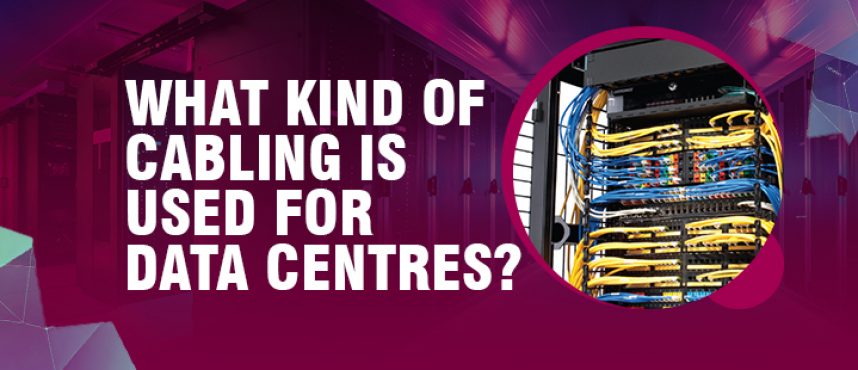What Kind of Cabling Is Used for Data Centres?
The forms of cabling that keep a data centre operational consist of power cables, ground cables and data transmission cables.
Data centre cabling is of two types –
- Copper cables and
- Fibre optic cables.
In case you are confused and cannot decide on the type of cabling you should choose for your data centre then read the following sections.
What Is Data Centre Cabling?
Data centre cabling, in simple words, is the network of cables that consists of power cables, ground wires and data transfer cables used in a typical data centre.
Data centre cabling is carried out in two formats –
- Structured data centre cabling and
- Unstructured data centre cabling.
Definitions for the above terms are as follows –
- Structured data centre cabling – involves the usage of an MDA (or Main Distribution Area) that acts as the interface through which all connections used in a data centre are run.
- Unstructured data centre cabling – is messy compared to the structured data centre cabling approach. In unstructured data centre cabling, the data links are established between devices. There is no central panel installed in this type of data centre cabling system.
What Type Of Data Centre Cabling Is Best Copper Coaxial or Fibre Optics?
According to the collective opinion of cabling engineers associated with revered structured cabling companies in Mumbai, it would be unwise to state that copper cabling is superior to optical fibre cabling for a data centre.
The reason is simple – the data transmission rate of optical fibre cabling is higher than copper cabling. There is a catch though – copper cabling is cheaper compared to fibre optic cabling as copper cabling needs minimal upkeep and low upfront capital expenditure.
Overview About Copper Cables
Copper cables used in data centres are known as copper coaxial cables. This type of cable consists of a primary copper cable that transmits data surrounded by a thick insulating material which is further wrapped in a metal shield to keep interfering signals at bay.
Benefit Of Using Coaxial Copper Cables Instead Of Fibre Optics In Data Centres
Data centres that primarily use copper coaxial cables instead of fibre optic cables can save more than 100 kilowatts of energy. Furthermore, the operational life of coaxial copper cables is more than fibre optic cables and it stands at (+-) fifty million hours!
Overview about Fibre Optics
A fibre-optic cable has an outer appearance that is similar to an electrical cable but at its core, instead of a copper wire, it contains optical fibres that will carry data in the form of light pulses instead of electricity.
Benefit Of Using Fibre Optic Cables Instead Of Fibre Optics In Data Centres
Fibre optic cables have a high data transmission rate when compared to copper cables. The reason is simple – instead of using electrons to transmit data from one point to the other, fibre optic cables transmit data using light pulses.
Furthermore, the data upload and download speeds of fibre optic cables are equal which is why one of the many USPs of fibre optic cables is “symmetric data speed”.
Reasons Why Copper Cables And Fibre Optics Are Better Together In Data Centres
Fibre data centre cables offer more speed and bandwidth compared to copper data centre cables but they come with hefty upfront costs and need regular upkeep.
Copper data centre cables, on the other hand, have limited bandwidth but they are more reliable compared to fibre optic cables therefore regular upkeep is not required. At the same time, they come with affordable upfront costs.
Fibre optic cables can only transmit data whereas copper data centre cables can be used to transmit data at speeds of up to 10 or 40 GB/s and at the same time, are used to supply up to 100 Watts of DC power to devices used at a typical data centre.
Hence, copper cables and fibre optics are best used together in a data centre to keep the establishment efficient, easy to maintain and affordable to set up.
Why Proper Data Centre Cabling Management Is Important?
According to the opinion of a network engineer associated with Network Techlab – one of the leading structured cabling companies in India, proper data centre cabling management should not be an afterthought as with efficient data centre cabling management procedure in place, a data centre becomes –
- More efficient
- Help in the reduction of maintenance costs
- Help in the reduction of daily operational costs and
- Keep downtimes at bay.
Conclusion
Whichever variant of data centre cabling you want to use at your place of business, it is always a good idea to hire a reputed structured cabling company in your vicinity. In case you are looking for a structured cabling company that can meet your requirements and that too at a reasonable tariff then contact Network Techlab. It is one of the leading IT service providers in India that has been offering IT solutions to its pan-India clientele for the last 25+ years. It is an ISO 27001:2013 certified company hence hiring them for all your data centre cabling requirements will be a great idea. For more details, please call +91-8879004536 or send an email at info@netlabindia.com.




